课后作业 Section B (1a-1e)
人教版英语九年级全册Unit4SectionB(1a1e)优秀教学案例

一、案例背景
本案例背景以人教版英语九年级全册Unit 4 Section B (1a-1e)为例,本节课主要内容是关于过去发生的事情的描述。通过本节课的学习,学生能够掌握一般过去时的用法,以及如何运用一般过去时描述过去发生的事情。同时,学生还能够通过本节课的学习,提高自己的阅读理解能力和写作能力。
2.情境模拟:我设计一些情境模拟活动,让学生在具体的情境中运用一般过去时描述过去发生的事情,提高学生的语言运用能力。
3.故事引导:我通过讲述一个与教学内容相关的故事,引发学生的思考,激发他们的学习兴趣,帮助他们更好地理解和记忆一般过去时的用法。
(二)问题导向
1.自主探究:我提出问题,引导学生自主观察、分析和归纳一般过去时的用法和规律,培养他们的思维能力和创新意识。
五、案例亮点
1.情境创设:通过利用图片和问题引导学生回忆过去的事情,我成功创设了一个轻松愉快的课堂氛围,激发了学生的学习兴趣和好奇心。这种情境创设不仅使学生更容易理解和记忆一般过去时的用法,还使他们能够更好地将所学知识运用到实际情境中。
2.学生主体性:在教学过程中,我始终将学生作为主体,注重培养他们的自主学习能力和创新能力。通过设计各种有趣的教学活动,我鼓励学生主动参与课堂,发挥自己的特长,从而提高了他们的学习效果和自信心。
(三)学生小组讨论
我将学生分成小组,并给他们提供一些关于过去发生的事情的图片或情境。学生根据图片或情境,运用一般过去时进行描述和交流。他们互相倾听并给予反馈,共同讨论和解决问题。通过小组合作,学生能够更好地运用一般过去时描述过去的事情,提高口语表达能力和交际能力。
(四)总结归纳
在每个小组讨论结束后,我将组织全班进行总结和归纳。我会邀请几个学生分享他们在小组讨论中的发现和心得,引导大家一起总结一般过去时的用法和规律。通过总结归纳,学生能够加深对一般过去时的理解和记忆。
人教版九年级英语上册:Unit 1 Section B (1a-1e)

Thanks, Ms. Manson.
1e
Role--play conversations using the information in 1c and 1d.
A:I don’t have a partner to practice English with. B:Maybe you should join an English club.
知识点 1 increase /ɪn'kriːs/ v.增加;增长
考向一 increase可用作及物动词,也可用作不及物动词, 意为“增加;增长”。 eg:Eating too much fried food can increase the risk of cancer. 吃太多的 油炸食品会增加得癌症的风险。
Ms. Manson: Why don’t you join an English language club
to practice speaking English? The English club
meets after school on Tuesdays and Thursdays.
Paul:
知识点 2 speed/ spiːd/ n.速度 eg:Safety is more important than speed.
安全比速度更重要。 考向 常用搭配
at a/the speed of
以……的速度
at high/low/full speed
以高速/ 低速/ 全速
speed up 动词词组
can even study on the subway on the way to school.
Paul:
That might really help! Thayou understand when people talk to you?
人教版英语九年级全册Unit8SectionB(1a~1e)优秀教学案例
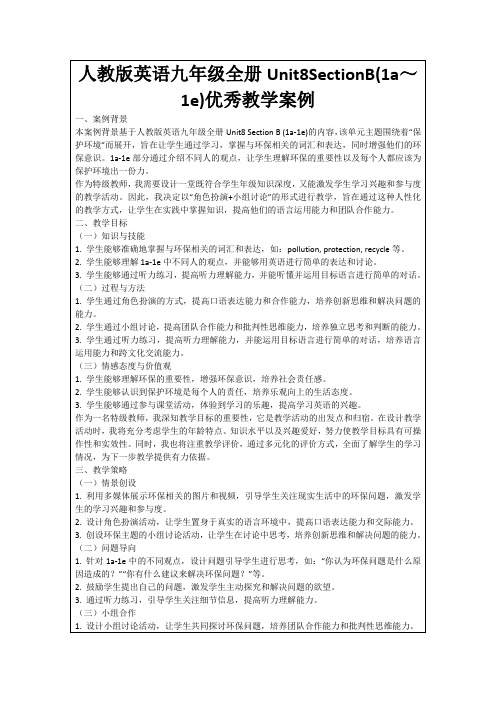
三、教学策略
(一)情景创设
1.利用多媒体展示环保相关的图片和视频,引导学生关注现实生活中的环保问题,激发学生的学习兴趣和参与度。
3.情景创设在教学中的应用:我利用多媒体展示环保相关的图片和视频,引导学生关注现实生活中的环保问题,使学生在真实的情境中学习,提高了学习的实效性。
4.问题导向的教学策略:我针对1a-1e中的不同观点,设计问题引导学生进行思考,使学生在解决问题的过程中,提高了听力理解能力和思维能力。
5.全面的评价方式:在教学过程中,我采用了多元化的评价方式,既关注了学生的知识与技能,又关注了过程与方法、情感态度与价值观等方面,使评价更加全面,更好地促进了学生的全面发展。
作为特级教师,我需要设计一堂既符合学生年级知识深度,又能激发学生学习兴趣和参与度的教学活动。因此,我决定以“角色扮演+小组讨论”的形式进行教学,旨在通过这种人性化的教学方式,让学生在实践中掌握知识,提高他们的语言运用能力和团队合作能力。
二、教学目标
(一)知识与技能
1.学生能够准确地掌握与环保相关的词汇和表达,如:pollution, protection, recycle等。
2.教师对学生的角色扮演和小组讨论进行点评,强调保护环境的重要性。
3.引导学生思考如何将所学内容应用到实际生活中,提高环保意a-1e,巩固所学知识。
2.布置作业:让学生写一篇短文,介绍自己对本节课所学的环保问题的看法和建议。
Unit 2 Section B1a-1e 22-23人教版七英语下
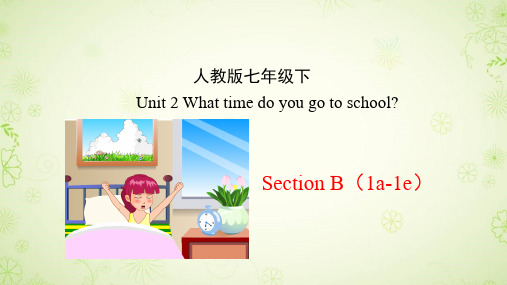
night
AM和PM AM表示“午前,上午”(午夜12:00后至 中午12:00前);PM表示“午后,下午” (中午12:00后至午夜12:00前)。在使用 中,常用小写形式,am和pm。在美式 英语中,实用形式为a.m.和p.m.
1a When do students usually do these things? Match the actions with the time
3. —When do you get up?你什么时候起床? —Usually about half past five. Then I run at six o’clock. 通常大约在五点半起床。然后我在六点钟跑步。 past用于逆读法表示三十分钟以前的时间,英语中 用half表示半小时。英语中整点用o’clock表示。
8. eat dinner7_:1_5_
3. eat breakfast_7_:0_0_ 9. take a walk ___
4. go to school7_:4_5_ 10. go to bed9:0_0__
5. go home4_:1_5_
6. do my homework5_:_3_0
Short-term memory test: Fill in the blanks.
A: When do you usually get up? B: I usually get up at 5:30.
整点读法
ten o’clock
six o’clock
eight o’clock
顺读法: 先时 后分
four ten
three fifty
five thirty-five
eight twenty
英语人教版八年级下册Unit 8 Section B (1a-1e)
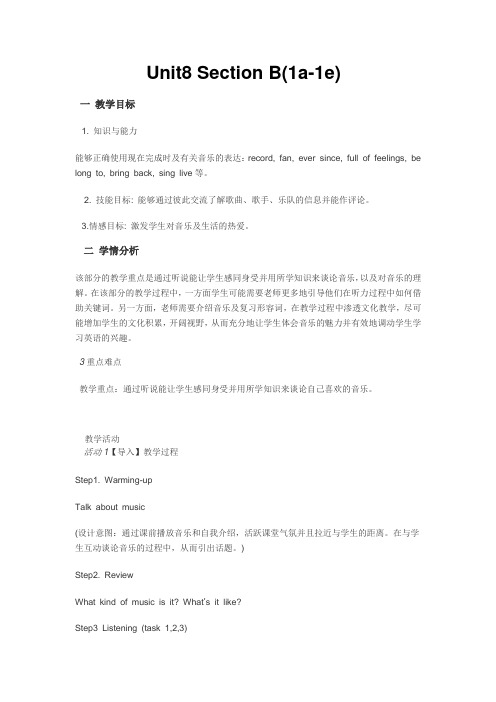
Unit8 Section B(1a-1e)
一教学目标
1. 知识与能力
能够正确使用现在完成时及有关音乐的表达:record, fan, ever since, full of feelings, be long to, bring back, sing live等。
2. 技能目标: 能够通过彼此交流了解歌曲、歌手、乐队的信息并能作评论。
3.情感目标: 激发学生对音乐及生活的热爱。
二学情分析
该部分的教学重点是通过听说能让学生感同身受并用所学知识来谈论音乐,以及对音乐的理解。
在该部分的教学过程中,一方面学生可能需要老师更多地引导他们在听力过程中如何借助关键词。
另一方面,老师需要介绍音乐及复习形容词,在教学过程中渗透文化教学,尽可能增加学生的文化积累,开阔视野,从而充分地让学生体会音乐的魅力并有效地调动学生学习英语的兴趣。
3重点难点
教学重点:通过听说能让学生感同身受并用所学知识来谈论自己喜欢的音乐。
教学活动
活动1【导入】教学过程
Step1. Warming-up
Talk about music
(设计意图:通过课前播放音乐和自我介绍,活跃课堂气氛并且拉近与学生的距离。
在与学生互动谈论音乐的过程中,从而引出话题。
)
Step2. Review
What kind of music is it? What’s it like?
Step3 Listening (task 1,2,3)
Step4 sing 2 pieces of songs
Step5 talk about “which one do you like,and why”。
七年级-人教版-英语-下册-[学习任务单]Unit-2-Section-B-(1a-1e)
![七年级-人教版-英语-下册-[学习任务单]Unit-2-Section-B-(1a-1e)](https://img.taocdn.com/s3/m/7099c7b2185f312b3169a45177232f60ddcce7b8.png)
Unit 2 What time do you go to school? (Period 3)Section B (1a-1e)学习目标学完这一课,你能够掌握:1.词汇half、past、quarter、homework、do (one’s) homework、run、clean、walk、take a walk;2.日常活动短语run、eat dinner、clean one’s room、do one’s homework、take a walk、go home等;3.能力:(1)掌握更复杂的时间表达方式(half、past、to、quarter、a.m./p.m.);(2)what time 问答日常活动的句型。
课前学习任务【学习任务一】阅读教材第10 页1a活动,翻译下列时间。
1.早上六点半________________________________2.下午三点十五分________________________________3.晚上六点四十五分________________________________4.晚上九点四十五分________________________________【学习任务二】阅读教材第10页1c活动,翻译下列短语。
1.起床________________ 2.吃早饭________________3.去上学________________ 4.回家________________5.做我的家庭作业________________ 6.打扫我的房间________________7.吃晚饭________________ 8.散步________________9.上床睡觉________________课堂学习任务【学习任务一】根据图片所示用英语写出时间。
_______________ _______________ ______________________________ _______________ _______________【学习任务二】1.根据图片所示用英语(half、past、to、quarter)写出时间。
初中英语九年级 Unit 13 Section B (1a-1e)教学设计

初中英语九年级 Unit 13 Section B (1a-1e)教学设计一. 教材分析本课选自人教版新目标英语九年级Unit 13 Section B (1a-1e),主要讲述了关于环保的话题。
1a部分是一篇关于澳大利亚保护野生动物的阅读材料,1b部分是对1a部分的词汇和短语进行练习,1c部分是听力练习,1d部分是口语练习,1e部分是写作练习。
通过本节课的学习,学生能够掌握关于环保的相关词汇和短语,提高听力、口语和写作能力。
二. 学情分析九年级的学生已经掌握了英语学习的基本语法和词汇,具备一定的听、说、读、写能力。
但部分学生在英语学习上存在恐惧心理,缺乏自信心。
针对这一情况,教师在教学过程中要注重激发学生的学习兴趣,提高他们的学习积极性。
同时,由于环保是一个热点话题,学生对此有一定的了解,可以在课堂上展开讨论,提高他们的参与度。
三. 教学目标1.知识目标:学生能够掌握关于环保的词汇和短语,理解1a部分的阅读材料,提高听力、口语和写作能力。
2.能力目标:学生能够运用所学知识进行实际交流,提高英语综合运用能力。
3.情感目标:学生能够认识到环保的重要性,培养保护环境的意识。
四. 教学重难点1.重点:学生能够掌握关于环保的词汇和短语,理解1a部分的阅读材料。
2.难点:学生能够运用所学知识进行实际交流,提高英语综合运用能力。
五. 教学方法1.任务型教学法:通过设置各种任务,激发学生的学习兴趣,提高他们的参与度。
2.情境教学法:创设真实的学习情境,让学生在实际情境中学会运用英语。
3.合作学习法:引导学生进行小组讨论,培养他们的团队协作能力。
六. 教学准备1.教师准备:备好相关环保的词汇和短语,制作PPT,准备听力材料。
2.学生准备:预习1a部分的阅读材料,完成相关作业。
七. 教学过程1.导入(5分钟)教师通过提问方式引导学生谈论环保话题,激发学生的学习兴趣。
例如:“你们知道哪些环保知识?”,“你们认为环保重要吗?为什么?”2.呈现(10分钟)教师展示1a部分的阅读材料,让学生快速阅读,了解大意。
【教育资料】Section B (1a-1e)学习专用
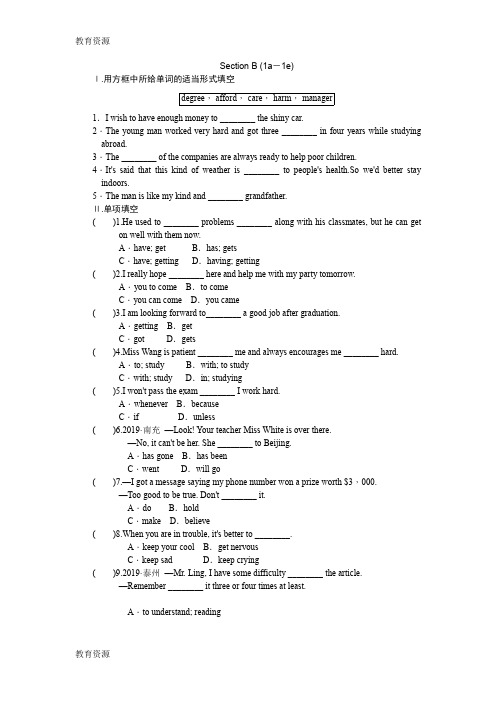
Section B (1a-1e)Ⅰ.用方框中所给单词的适当形式填空degree, afford, care, harm, manager1.I wish to have enough money to ________ the shiny car.2.The young man worked very hard and got three ________ in four years while studying abroad.3.The ________ of the companies are always ready to help poor children.4.It's said that this kind of weather is ________ to people's health.So we'd better stay indoors.5.The man is like my kind and ________ grandfather.Ⅱ.单项填空()1.He used to ________ problems ________ along with his classmates, but he can get on well with them now.A.have; get B.has; getsC.have; getting D.having; getting()2.I really hope ________ here and help me with my party tomorrow.A.you to come B.to comeC.you can come D.you came()3.I am looking forward to________ a good job after graduation.A.getting B.getC.got D.gets()4.Miss Wang is patient ________ me and always encourages me ________ hard.A.to; study B.with; to studyC.with; study D.in; studying()5.I won't pass the exam ________ I work hard.A.whenever B.becauseC.if D.unless()6.2019·南充—Look! Your teacher Miss White is over there.—No, it can't be her. She ________ to Beijing.A.has gone B.has beenC.went D.will go()7.—I got a message saying my phone number won a prize worth $3,000.—Too good to be true. Don't ________ it.A.do B.holdC.make D.believe()8.When you are in trouble, it's better to ________.A.keep your cool B.get nervousC.keep sad D.keep crying()9.2019·泰州—Mr. Ling, I have some difficulty ________ the article.—Remember ________ it three or four times at least.A.to understand; readingB.understanding; readingC.understanding; to readD.to understand; to read()10.In this school, the students are asked________ mobile phones.A.not to use B.not usingC.not use D.to not useⅢ.短文填空阅读下面短文,在空白处填入适当的单词。
人教版英语九年级全册Unit7SectionB(1a—1e)优秀教学案例

3.学生能够在实际语境中,恰当运用一般过去时态,提高自信心,增强语言表达的勇气。
4.学生通过学习英语,拓宽国际视野,增强跨文化交际意识,培养尊重不同文化的价值观。
在教学过程中,教师应关注学生的个体差异,给予每个学生充分的关注和指导,确保他们在原有基础上得到提高。同时,注重培养学生的综合素质,使他们能够在知识与技能、过程与方法、情感态度与价值观等方面全面发展。
在教学设计上,本案例旨在通过生动的情景设置、丰富的教学活动,激发学生的学习兴趣,让他们在真实语境中感知、实践和巩固过去时态。同时,注重培养学生的团队协作能力和自主学习能力,使他们能够在小组讨论和个体实践中,更好地掌握英语语言知识。
针对九年级学生的知识水平和学习需求,本案例将教学目标定为:1.能够准确运用一般过去时描述过去发生的日常活动;2.提高听、说、读、写综合语言运用能力;3.培养团队协作和自主学习能力。
三、教学策略
(一)情景创设
1.教师通过多媒体展示过去时的相关图片,如参观农场、去市场购物等,引导学生感知过去时态的运用。
2.利用实物、道具等,创设真实情境,让学生在实际操作中,体会一般过去时态的用法。
3.设计角色扮演活动,让学生扮演不同角色,进行过去时的对话,增强对过去时态的感知。
4.教师创设问题情境,引导学生运用过去时态进行思考和回答,如“你上周做了什么?”等。
五、案例亮点
1.情境创设丰富多样:本案例通过多媒体展示、实物道具、角色扮演等多种方式,创设了生动直观的教学情境,让学生在真实语境中感知、实践和巩固一般过去时态,提高学生的语言运用能力。
2.问题导向激发思考:教师在教学过程中提出具有启发性的问题,引导学生思考和探索一般过去时态的构成、用法和动词变化规则,激发学生的探究兴趣,培养学生的自主学习能力。
第三课时 Section B (1a - 1e)

第三课时Section B (1a~1e)【学习目标】1.学生能掌握短语:junk food,be good for,eat fruit,drink coffee。
2.学生能听懂谈论生活习惯的对话,培养自己的听力技能。
3.通过了解各自的日常生活习惯,提升自己良好的生活习惯,形成良好的师生关系。
【学习重点】用所学的功能语言,与学生交流日常生活习惯。
【学习难点】听力训练,提高学生的综合听说能力Learning action tips:Revise the knowledge learned and let students know the importance of developing a healthy diet habit by this step.Learning action tips:Preview the words on Page 12. Read the words by phonetic symbols, then underline new words in the text and mark their Chinese meaning. At last finish the task in 1a.【Method coach】▲health和healthy的用法health n.健康;人的身体(或精神)状态healthy adj.健康的keep healthy=be in good health保持健康【导练】锻炼能帮助你保持健康。
Exercise can help you to__keep__healthy/be__in__good__health.Task 2Learning action tips:Listen to the tape and finish the task in 1c, listen again and finish the task in 1d.Students imitate the listening contents and practice the dialogue in role, ask a few pairs to act out.情景导入生成问题1.T:Do you like junk food?S:________________________________________________________________________2.T:How often do you eat it?S:________________________________________________________________________3.T:I think ________________ You should ____________.S:________________________________________________________________________自学互研生成能力Task 1Let's read the new words and the phrases.1.I can read.(我会读)junk food,be good for,eat fruit,drink coffee,health,healthy2.I can write.(我会写)翻译下列短语和句子。
人教版八年级上册英语 Unit 3 Section B (1a-1e)

第三课时: SectionB (1a-1e)
Ihaveagoodfriend. Sheisverysmart.
Ihaveagoodfriend. heisgoodatmusic.
1a
Whatkindsofthingsareimportantinafriend? Rankthethingsbelow [1-7] (1isthemostimportant).
eg:Thewomanhasatalent/giftforcooking. 这个女人有烹饪的天赋。 Heisagreattalent.他是个了不起的人才。
典例 Theboy_____C___maths. A. istalentedB. hastalent C. istalentedinD. havetalentin
Mfryohmobbiesarediffer不ent同fromLucy’s.
我的爱好与露西的不同。
拓展 Thesametoyou!表示“你也一样!”,是回复对方祝 福的常用语。 eg:—HappyNewYear!新年快乐! —Thesametoyou!你也一样!
典例 ThoughLilyandLucyaretwins, theylook______C__eachother.
Interviewer:OK, Isee… Molly:Oh, andhespeaksmoreloudlythanme. I’malittlequieter.
ButI’dsaywe’rebothprettyoutgoing. Interviewer:Howaboutyou, Mary? Whosyourbestfriend? Mary:MybestfriendisLisa. Interviewer:Whatdoyoulikeabouther? Mary: Well, she’sagoodlistener, andthat'simportanttome.
SectionB1a-1e课后跟踪练习(原卷版参考答案)

Unit 1 How can we bee good learners?Section B 1a1e课后跟踪练习Ⅰ.根据首字母和汉语提示,写出下列句子所缺的单词,使句意通顺。
1.We should read aloud to practice our p___________ .2.As teachers, we should be p_______________ with our students.3.I don’t have a p__________ to practice English with. What should I do?4.The s___________ to bee a good English learner is listening to the teacher carefully in class.5.He should find a s ______________ to practice writing and speaking.6.I always look them up in the d__________ when I don’t know English new words.7.You can i__________ your pronunciation by repeating out loud.8.I couldn’t u________ spoken English two years ago.9.I think you should j___________ an English club to practice your spoken English.10.The only problem is that I don’t get much w_________ practice.Ⅰ.将下列句中的汉语部分译成英语,注意使用适当的形式。
1.我不知道怎样提高我的阅读速度。
SectionB1a1e(完整版)3
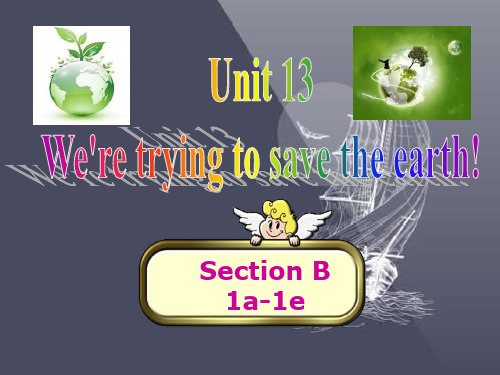
7. throwing rubbish in the bins on.
8. cleaning up the river
However,___________________________.
Saving the earth starts with small things. For example, I usually turn off the shower when I wash my hair because I think it’s a good way to save water. Also, I always throw rubbish in the bins. Simple things like that can help a lot to protect our environment. What’s more, to cut down water pollution, I will help clean up the river in my free time from now on. However, I would not go to work by bike because I live far from school and it’s not convenient for me. But maybe I will try to take public transportation in the future instead of riding in cars.
Things Julia and Jack talk Things Julia is
Things Julia will Things Julia would
about
doing now
do in the future never do
Section B 1a-1e

3. 今日事,今日毕。
Pre-class
Words and expressions
repair fix fix up
v. 修理;修补 v. 修理;安装 修理;装饰
Read the words and
phrases after
teacher.
give away
赠送;捐赠
take after
(外貌或行为)像
Unit2 I’ll help to clean up the city
4. I give it away. give away 意为“赠送”。
Step5:Summa
1.give away
赠送
ry
2.fix up
修理
3.be similar to 与...相似
4.take after
长得像
5.run out of
用完/耗尽
6.take care of 照顾/照料
Step6:Exercises
1.I’ve run out of it. run out of = use up “用完”、“卖光”。句子 的主语是人或使用的物。注意不能用于被动语态。
e.g. I am running out of my money. = My money is running out. We are running out of the gas. = Our car is running out of the gas.
7第三课时 Section B ( 1a-1e )
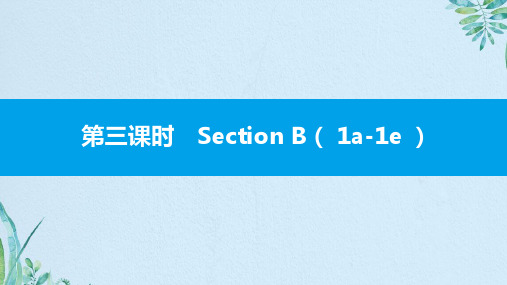
5.across the street
这条街对面
Ⅱ.根据首字母及汉语提示补全单词
1.Can you see those birds flying high in the sky ( 天空 )?
2.They have six holiday apartments ( 公寓套房 ) for sale.
3.I hope there will be world peace ( 和平 ).
第三课时
Section B ( 1a-1e )
基础知识回顾
综合能力提升
-4-
Ⅰ.单项填空
( B )1.—What will you be when you grow up?
—I think I will be
astronaut.
A.a B.an C.the D./
( B )2.I’ll live
a space station one day.
第三课时 Section B ( 1a-1e )
第三课时
Section B ( 1a-1e )
基础知识回顾
综合能力提升
-2-
Ⅰ.英汉互译
1.住在一所公寓里
live in an apartment
2.一名宇航员
an astronaut
3.on the space station 在太空站
4.fly rockets to the moon 乘火箭飞往月球
fewer
people?
What will Jessica do in the future?( 不超过10个词 )
No,it is5n’.tHisDf.ather will buy a new bicycle tomorrow.(
Section B (1a-1e)

Things Julia and Jack talk about ___ turning off the lights ___ turning off the shower ___ not using paper napkins ___ taking your own bags when shopping ___ not riding in cars ___ riding a bike ___ recycling paper
Turn off the lights when you leave a room.
Turn off the shower while you are washing your hair.
recycle bookt can we do to help save the earth? Rank these items from the easiest (1) to the most difficult (5).
1b Compare your answers in 1a with your partner.
Recycling paper is really easy.
I agree. But it’s hard to stop riding in cars.
Listen and check (√ ) the things that Julia
Jack talk about doing now
will do in the would never
future
do
turning off the lights
turning off the shower
Things Julia and Jack talk about
【教材讲解配套】Unit12 SectionB(1a-1e)课后作业
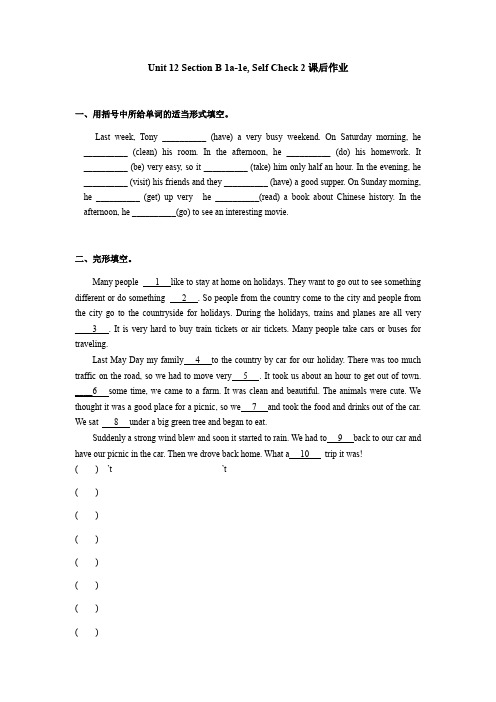
一、用括号中所给单词的适当形式填空。
Last week, Tony __________ (have) a very busy weekend. On Saturday morning, he __________ (clean) his room. In the afternoon, he __________ (do) his homework. It __________ (be) very easy, so it __________ (take) him only half an hour. In the evening, he __________ (visit) his friends and they __________ (have) a good supper. On Sunday morning, he __________ (get) up very he __________(read) a book about Chinese history. In the afternoon, he __________(go) to see an interesting movie.
Last May Day my family4to the country by car for our holiday. There was too much traffic on the road, so we had to move very5. It took us about an hour to get out of town.____6some time, we came to a farm. It was clean and beautiful. The animals were cute. We thought it was a good place for a picnic, so we7and took the food and drinks out of the car. We sat8under a big green tree and began to eat.
- 1、下载文档前请自行甄别文档内容的完整性,平台不提供额外的编辑、内容补充、找答案等附加服务。
- 2、"仅部分预览"的文档,不可在线预览部分如存在完整性等问题,可反馈申请退款(可完整预览的文档不适用该条件!)。
- 3、如文档侵犯您的权益,请联系客服反馈,我们会尽快为您处理(人工客服工作时间:9:00-18:30)。
Section B (1a-1e)
Ⅰ. 用括号内所给单词的适当形式填空。
1. I might________(fail) the test because of the time.
2. Do you often worry about________(pass) this test?
3. Bob should be allowed to take the test________(late) though he is late.
4. The old rules should be________(change) by us.
5. You can't go anywhere until you've________(finish) your homework.
Ⅱ. 单项选择。
6. —Why are you upset?
—I________.
A. passed the math test
B. studied with friends
C. failed the math test
D. got to school
7. Our English teacher is very strict ________ us and he is strict ________ his teaching.
A. with; at
B. in; at
C. with; in
D. in; in
8. The teachers think students should ________ to do their homework with friends.
A. are allowed
B. are allowing
C. be allowed
D. be allowing
9. Jack is a little unhappy recently because he always ________ his grades of the final exam.
A. looks forward to
B. makes sure
C. worries about
D. comes up with
10. —I think students should have mobile phones to call their parents.
—________. They often use them to play games instead.
A. I hope so
B. I disagree
C. No problem
D. Good idea Ⅲ. 按要求完成下列各题。
(每空一词)
11. I think we should be allowed to choose our own clothes. (改为否定句)
I ________ think we ________ be allowed to choose our own clothes.
12. Jack isn't silly. I think. (合并为一句)
I ________ think Jack ________ silly.
13. Tony failed the math test last week. (改为同义句)
Tony________ ________the math test last week.
14. You can't lend the book to others. (改为被动语态)
The book________ ________ ________to others by you.
15. The teacher allowed Tom to take the test later. (改为同义句)
Tom________ ________to take the test later by the teacher.
Ⅳ. 根据汉语意思及提示完成句子, 每空一词。
16. 不要担心你的考试。
我相信你会成功。
________ ________ ________your test. I believe you'll succeed.
17. 父母不应该对青少年要求太严格。
Parents shouldn't________ ________ ________ ________teenagers. 18. 有时候杰克上课迟到。
(get)
Sometimes Jack________ ________ ________ ________.
19. 你曾补考过吗?
Have you ever________ ________ ________ ________?
20. 学生不被允许带手机进学校。
Students________ ________ ________ ________mobile phones into school. Ⅴ. 在空白处填入一个适当的句子, 使对话完整。
Dad: Peter, you look worried. (21)________________?
Peter: I think I'll fail the math test, Dad.
Dad: (22)________?
Peter: I missed the bus and I had to walk to school.
Dad: So?
Peter: I got to class late, and there was a big test today.
Dad: And you weren't allowed to take the test?
Peter: (23)________. But I know I could pass the test.
Dad: Well, Peter, you know, the school has to have rules.
Peter: I know. But it's unfair. I should be allowed to take the test later.
Dad: (24)________. Maybe you could talk to your teacher after school and explain what happened. He'll understand.
Peter: I'll do that. Thank you.
Dad: (25)________.
Section B(1a-1e)
答案:
Ⅰ. 1. fail 2. passing 3. later 4. changed 5. finished
Ⅱ. 6. C
7. C点拨:be strict with sb. 对某人要求严格;be strict in sth. 对某事要求严
格。
8. C9. C10. B
Ⅲ. 11. don't;should12. don't;is 13. didn't pass14. can't be lent
15. was allowed
Ⅳ. 16. Don't worry about
17. be too strict with
18. gets to class late
19. taken a test later
20. aren't allowed to bring
Ⅴ. 21. What's wrong/What's the matter 22. Why23. That's right/Yes
24. I agree25. You're welcome。
